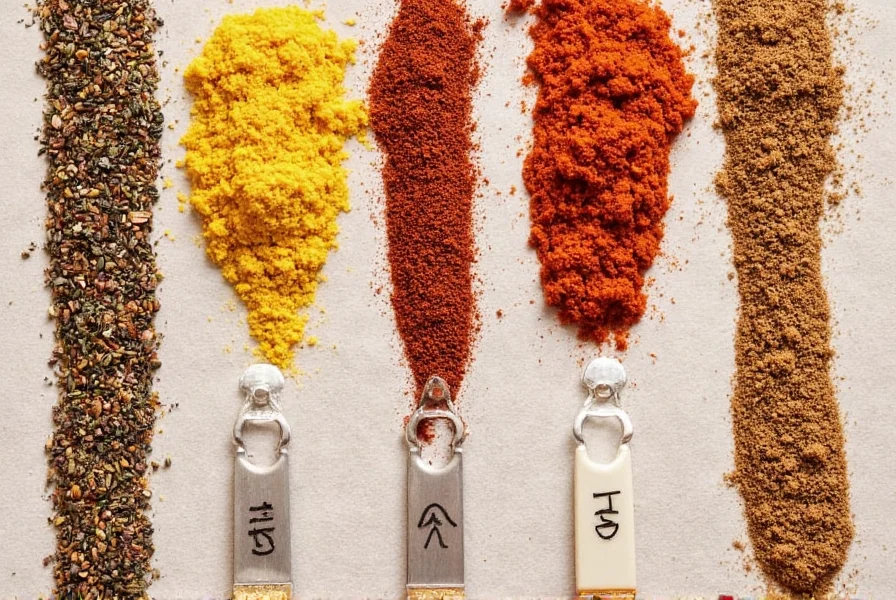Table of Contents
Introduction to Seasoning for Red Beans and Rice
Mastering red beans and rice seasoning requires understanding the essential spices that create authentic flavor. The five core spices for this dish are paprika, garlic powder, onion powder, cayenne pepper, and thyme. These ingredients form the foundation of Creole and Cajun seasoning blends used in traditional New Orleans cuisine.
Key Seasonings That Make the Magic Happen
These five spices deliver the perfect balance of heat, depth, and aroma:
- Paprika - Provides smoky sweetness and rich red color
- Garlic powder - Adds savory umami depth
- Onion powder - Enhances natural sweetness of beans
- Cayenne pepper - Delivers controlled heat without overpowering
- Dried thyme - Brings earthy freshness and complexity
| Seasoning Type | Flavor Profile | Best For |
|---|---|---|
| Cajun | Bold, spicy, smoky | Creole-inspired dishes |
| Italian Herb | Herby, aromatic | Lighter, Mediterranean-style beans |
| Mexican Street | Tangy, zesty, slightly spicy | Tex-Mex or chili-infused recipes |
| Old Bay | Salty, savory, with a bit of heat | Classic Southern recipes |


Practical Tips for Perfectly Seasoned Red Beans and Rice
- Toast dry spices before adding - Heat spices in a dry pan for 1-2 minutes to release essential oils
- Add salt at the end - Salt prevents beans from softening properly if added too early
- Layer flavors during cooking - Add spices when sautéing the "holy trinity" (onions, celery, bell peppers)
- Balance with acid - Finish with a splash of vinegar or lemon juice to brighten flavors
- Simmer for flavor development - Allow 30-45 minutes of simmering for spices to fully integrate

Frequently Asked Questions About Red Beans and Rice Seasoning
What are the 5 essential spices for red beans and rice?
The five essential spices for authentic red beans and rice are: 1) Paprika (for color and smoky sweetness), 2) Garlic powder (for savory depth), 3) Onion powder (for aromatic sweetness), 4) Cayenne pepper (for heat), and 5) Thyme (for earthy freshness). These form the foundation of most Creole and Cajun seasoning blends used in this classic dish.
How much seasoning should I use for red beans and rice?
A good starting point is 1-2 tablespoons of seasoning blend per pound of beans. Start with 1 teaspoon, let the dish simmer for 15-20 minutes, then taste and adjust. Remember that flavors concentrate as the dish cooks, so it's easier to add more seasoning than to fix an over-seasoned dish. If using individual spices, use ½ teaspoon of each main spice per pound of beans.
When should I add seasoning to red beans and rice?
Add most dry seasonings when sautéing the "holy trinity" (onions, celery, and bell peppers) to toast the spices in oil. Avoid adding salt too early as it prevents beans from softening properly. Add salt in the last hour of cooking. Fresh herbs like thyme should be added early; delicate herbs like parsley go in at the end.
What's the difference between Cajun and Creole seasoning for red beans and rice?
Cajun seasoning typically has more cayenne and black pepper for heat, with less emphasis on herbs. Creole seasoning usually contains more herbs like oregano and thyme, along with paprika. Traditional New Orleans red beans and rice recipes typically use Creole seasoning, but personal preference plays a big role. Many commercial blends blur these distinctions, so check ingredient labels if authenticity matters to you.
Can I make red beans and rice seasoning without salt?
Yes, and it's recommended for better control. Salt can be added separately to taste since beans absorb salt differently depending on freshness and cooking method. A salt-free seasoning blend allows you to adjust salt levels at the end of cooking when you can properly assess the flavor.
How do I fix over-seasoned red beans and rice?
For overspiced dishes, add a dollop of sour cream or fresh lime juice to balance heat. For oversalted dishes, add a peeled raw potato to absorb excess salt (remove after 15-20 minutes), or dilute with unsalted broth. For overpowering spice blends, add more beans and rice to dilute concentration. Let the dish rest for 10-15 minutes before making major corrections as flavors mellow with time.
Conclusion: Elevate Your Dish with the Right Spices
Seasoning for red beans and rice is more than just adding spices - it's about understanding how each ingredient contributes to the final flavor profile. By focusing on the five essential spices and using them with proper technique, you can transform simple ingredients into an authentic, restaurant-quality dish. Remember that quality ingredients and proper timing are key to achieving that perfect balance of heat, depth, and aroma that makes this dish unforgettable.










 浙公网安备
33010002000092号
浙公网安备
33010002000092号 浙B2-20120091-4
浙B2-20120091-4